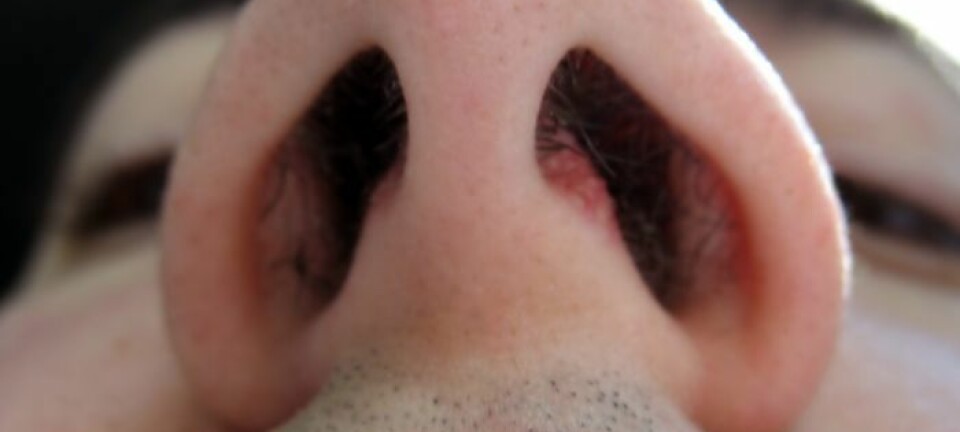
Why you should train your sense of smell
Mette Bratt researches the strengthening of the sense of smell. She is now working with test persons who have normal senses of smell. You might consider this ― you might not be capable of judging your own sensitivity to odours.
Certain people have extremely acute senses of smell. Many who might think they belong in that bunch are absolutely wrong. We humans are poor at judging this sense on our own.
“Many of those who come to us and think they have an extra sharp sense of smell don’t really,” says Dr Mette Bratt.
Her medical field is the sense smell. She is a physician and head of Department of Ear, Nose and Throat, Head and Neck Surgery at St. Olavs Hospital in Trondheim.
When Bratt and her colleagues measure someone’s olfactory powers, they look at three different aspects:
1: How much smell is needed before they notice it? 2: Can they discern it from other smells? And 3: Can they identify the smell?
Maybe you can smell coffee but not from very far away. That means you need a high concentration of a smell, molecules in the air, before you register them. Some also have trouble identifying a smell – is it clove, lemon or a rose?
Multiple causes
The nose as an organ is much larger than that proboscis you see in the mirror. Nerves that register smells, detecting chemical substances in the air, are at the top of the nose. They send signals along nerves that run through a porous wall of skull bone up to olfactory bulb which is located right below the brain. It sends signals to the olfactory regions of the brain, which are what make us conscious of what we are smelling.
This all works fine for some whereas others have a poor sense of smell for one reason or another.
Some lose their sense of smell after suffering head trauma, perhaps as the victims of violence. Others can have a poorer sense of smell because of polyps in the nose or simply a powerful head cold.
“Some might not be able to smell anything. They don’t notice the smell of sewage or smoke,” says Bratt.
Mette Bratt and her colleagues are conducting experiments to see if they can help people to exercise their sense of smell by taking whiffs of the same things repeatedly every day for a certain while.
Right now their research project involves people with a normal sense of smell.
Need more human guinea pigs
The persons being tested in the study are given concentrated samples of substances to smell at home ― the scents for instance of eucalyptus, rose, clove or lemon. But this is not a completely rosy task.
“They have to be prepared to make an effort and do some work on their own,” says Bratt.
They have to also smell samples three times a day for three months and the researchers will test some of them with MRI brain scans.
“This is really enticing. We want to find out whether work-outs on the sense of smell increases the volume of the bulbus olfactorius and change the flow of blood to the olfactory and memory areas of the brain,” says the researcher.
Any readers who live in the Trondheim area who would like to participate in the study can find information on the web pages of St. Olavs Hospital.
Can it keep us in better mental health?
A smell can bring back childhood memories of warm sunny days, of autumn forests, of various foods. We might link the smell of autumn to wet pine needles or a hot day with the smell of straw. Smell is linked to memory. This is because neurons link the olfactory areas of the brain with memory areas so that the signal of a known smell triggers both.
As we age our sense of smell is impaired, just as our vision and sense of hearing grow weaker.
An American study from 2014 showed that elderly people who lose their sense of smell run four times the risk of dying within the next five years compared to ones their age with a good sense of smell. The researchers stressed that the poor sense of smell is not the cause of death, but a sign that something is not quite as it should be in the body.
“Generally as we age we need a higher concentration of a smell. We have to interact with more molecules of something before we notice it. Alzheimer’s patients struggle to identify smells. They can register a smell without being able to pin down what it is,” says Bratt.
One question that the researchers are asking is whether we can keep ourselves mentally healthier if we train and improve our sense of smell.
“This is highly uncertain and we have all sorts of open questions: Can this be of any help regarding early onset dementia?” says Bratt.
Quality of life
Why do we need to exercise out sense of smell? This is not as necessary for our survival as it is for animals, or for our prehistoric ancestors. Bratt, however, is quick to point out that if we lack this sense it hampers us in
certain ways and impacts our quality of life.
“We can overlook signs of danger. If something is burning we fail to smell it. If we lose our sense of smell we lose most of our experience of tastes. Some 80 percent of what we call taste depends on a working sense of smell.”
“The sense of smell can also be important for our choice of a partner and for sexuality.”
“Depression is also connected to smells. Our sense of smell decreases if we are depressed.”
Bratt refers to a study in which people aged 50 and up exercised their sense of smell. They became less affected by depression and generally felt better than a control group who instead of olfactory training solved sudokus.
A study from 2012 found that persons born without a sense of smell were more often depressed and socially insecure than others.
Train your nose!
If you have a poor sense of smell or have lost it, Bratt recommends that you try to exercise it. Not everyone has access to a medical researcher who specializes in this, but you can do a lot on your own.
For instance, you can get hold of sample scents or visit a shop that peddles small bottles of scents for adding to bath water.
The scents the researchers use in their test in Trondheim are eucalyptus, rose, clove and lemon.
You need to take a whiff of these every day for three months.
“Here at St. Olavs we recommend four minutes of this in the morning and evening for three months.” The researchers think most of the improvement comes in the first month or two but the sense of smell could take longer to improve.
Nasal sprays as a cause
If you have been using nasal sprays for some time and your sense of smell has diminished from it you can get better within a few weeks or months if you can quit the spray.
But Bratt has also seen cases in her job as a physician where people who have used nasal sprays over long periods have continued to have an impaired sense of smell after cutting out the nasal medication.
This might be expected, she thinks.
“We see that if a person has lost the sense of smell over a longer period there are changes in the size of the olfactory bulb. If you don’t use your sense of smell it might decrease. We don’t know enough about this but it wouldn’t hurt to try and exercise the sense of smell,” says Bratt.
-------------------------------------
Read the Norwegian version of this article at forskning.no
Translated by: Glenn Ostling
































